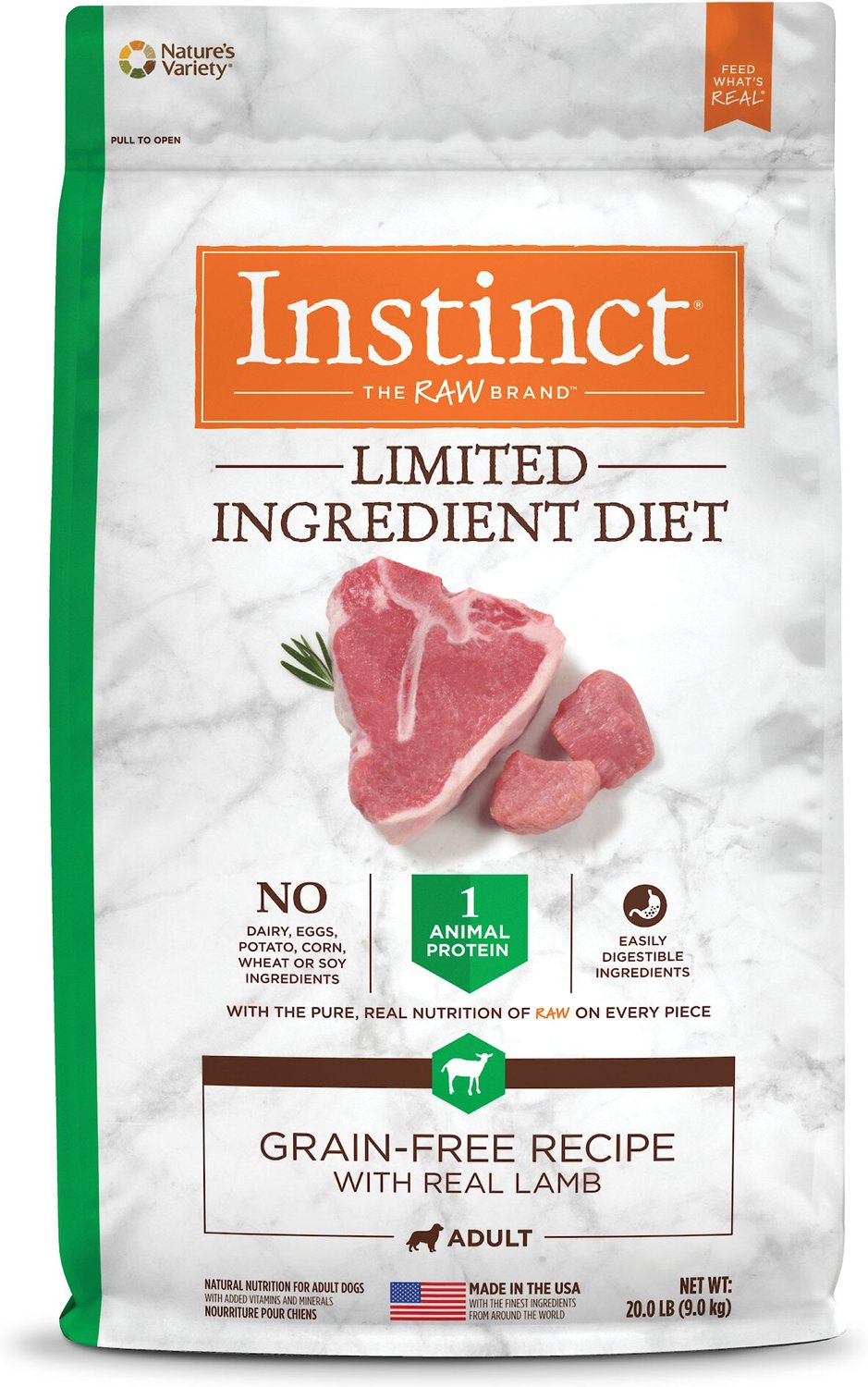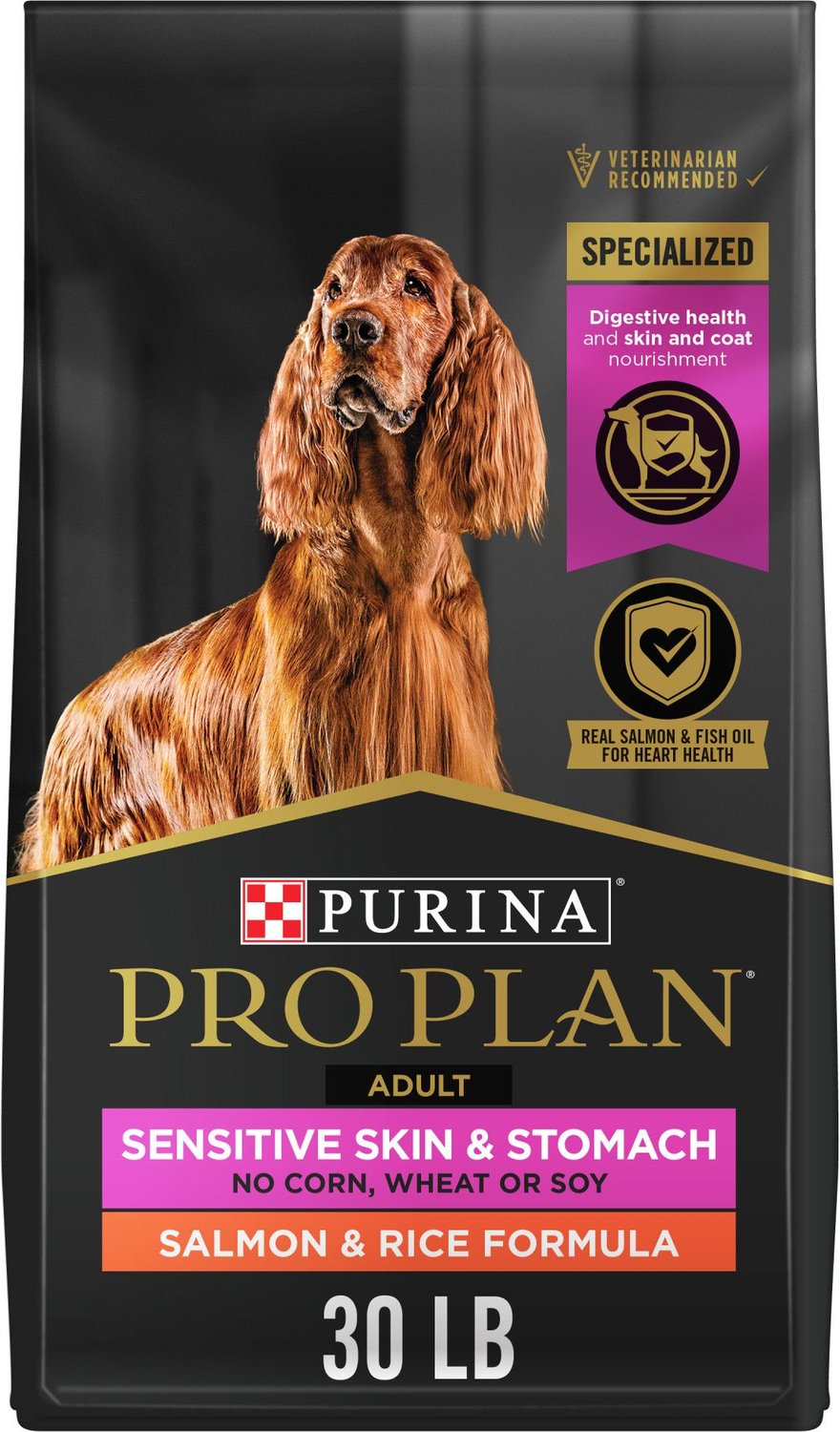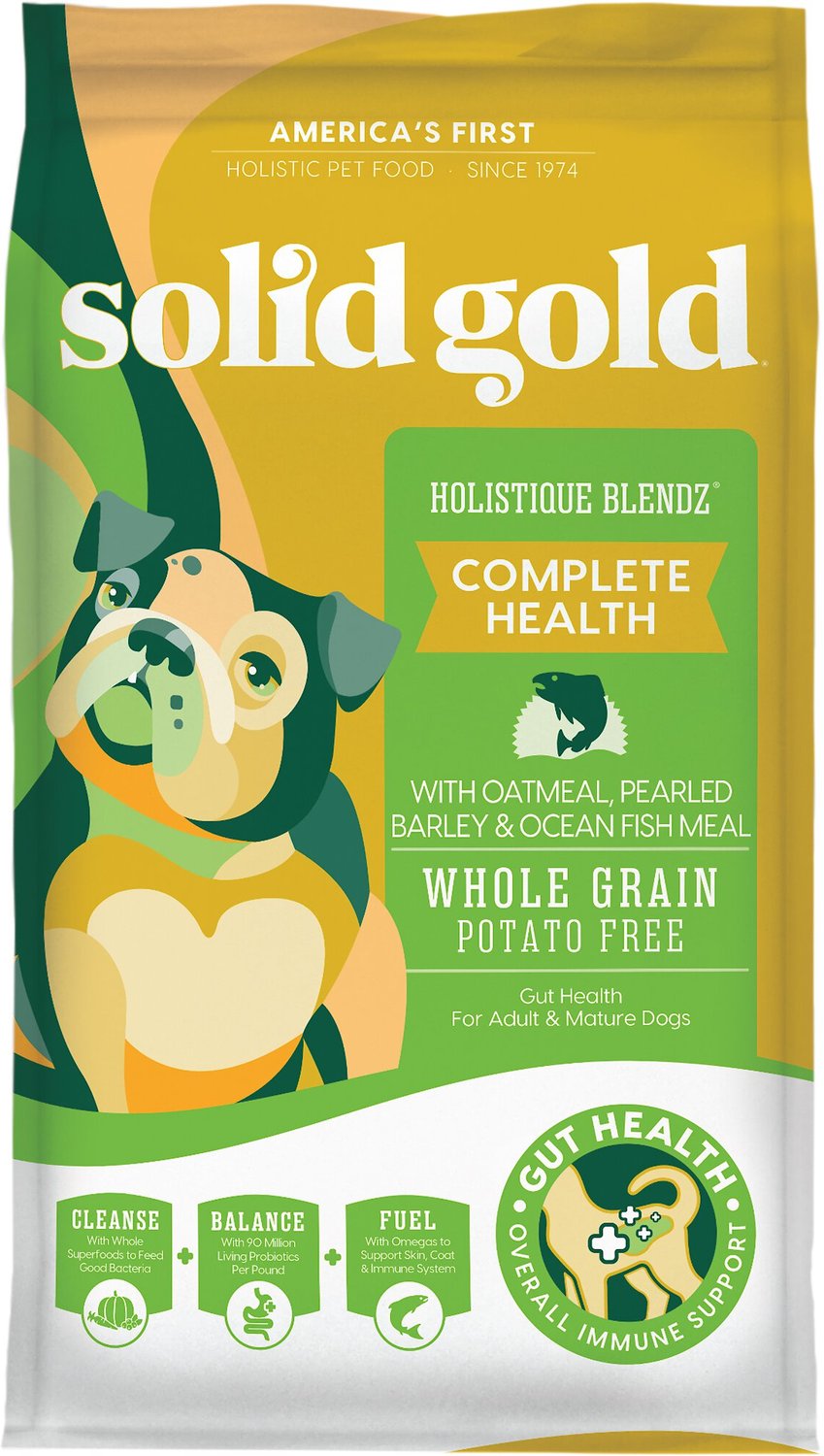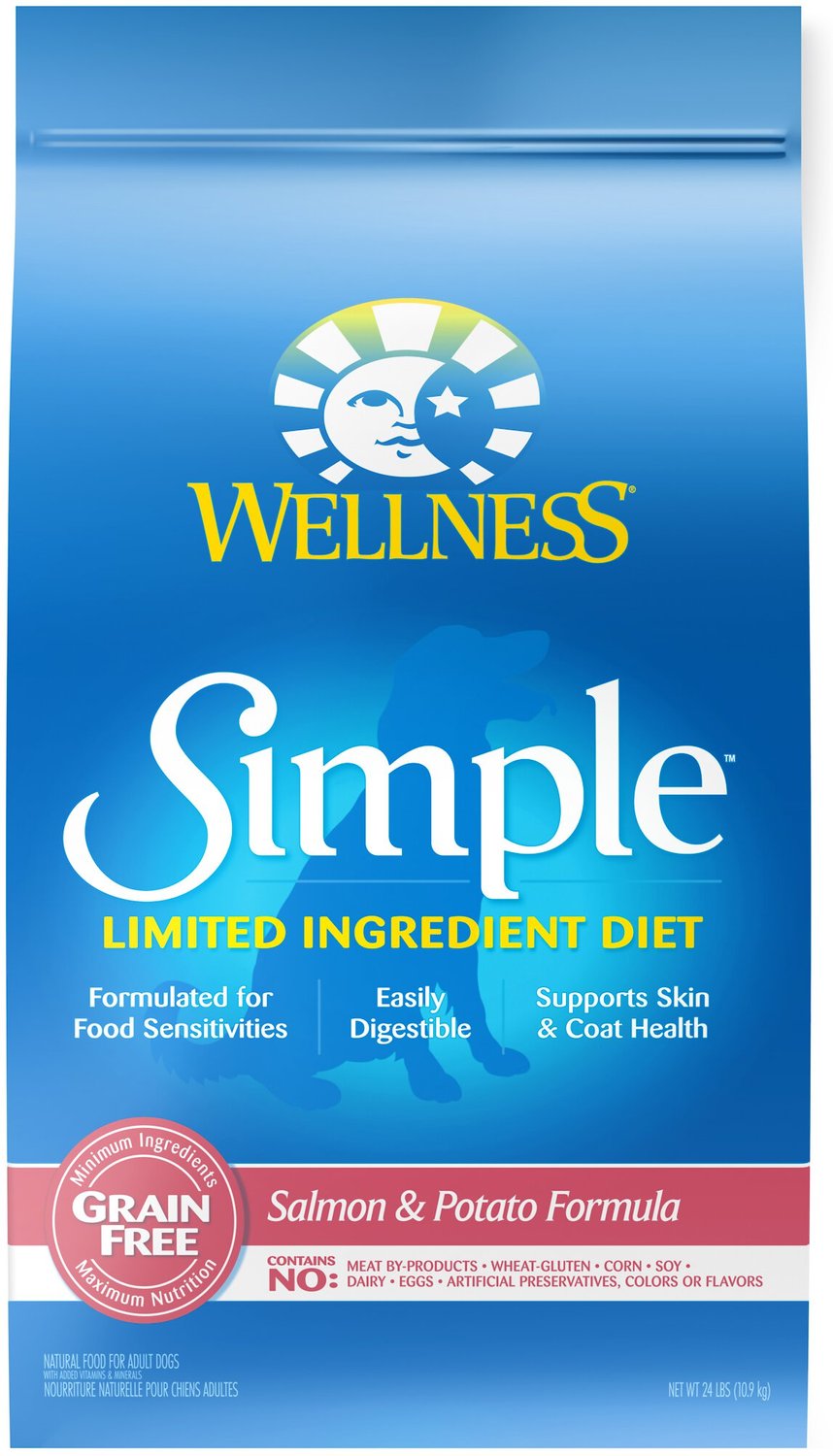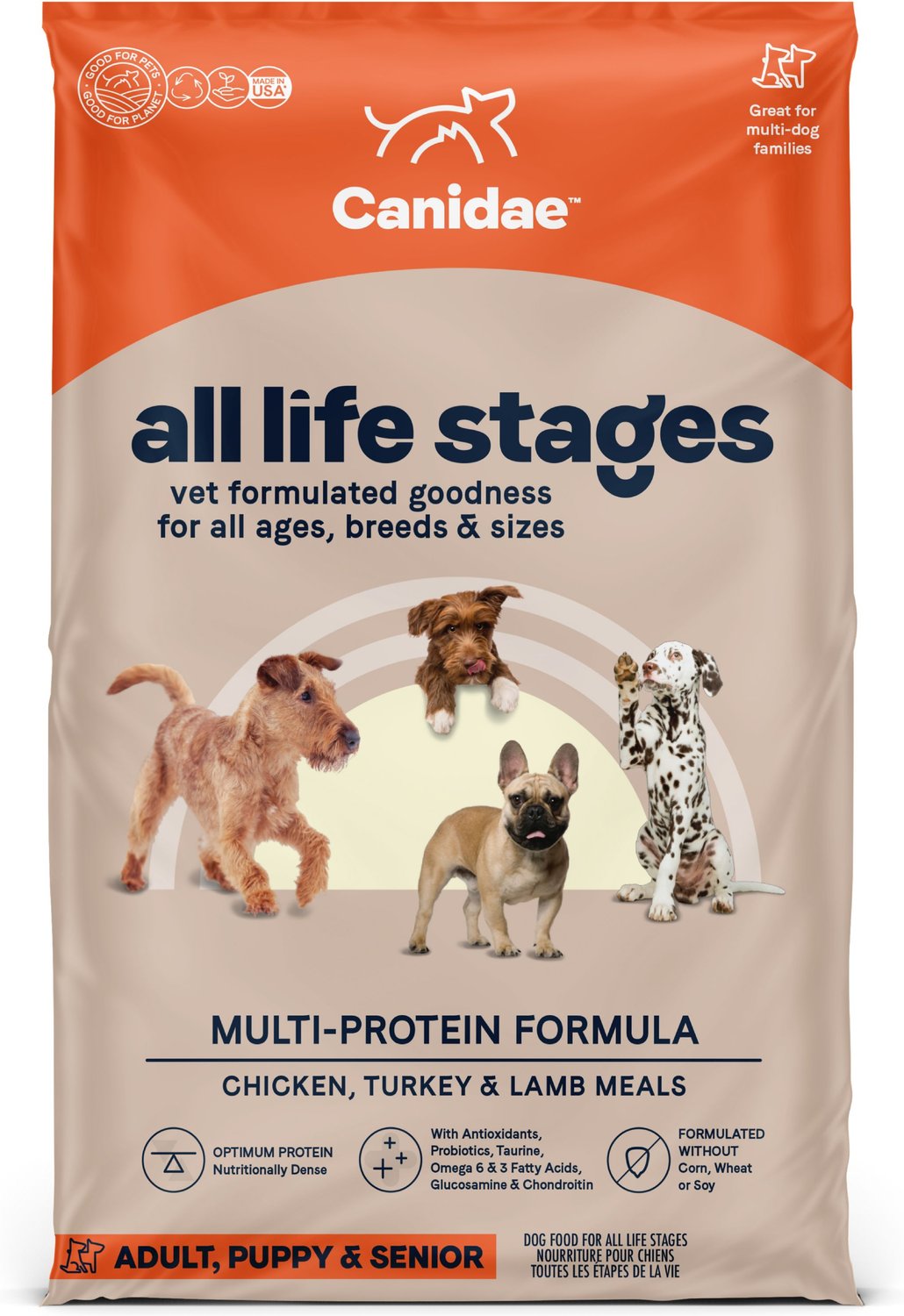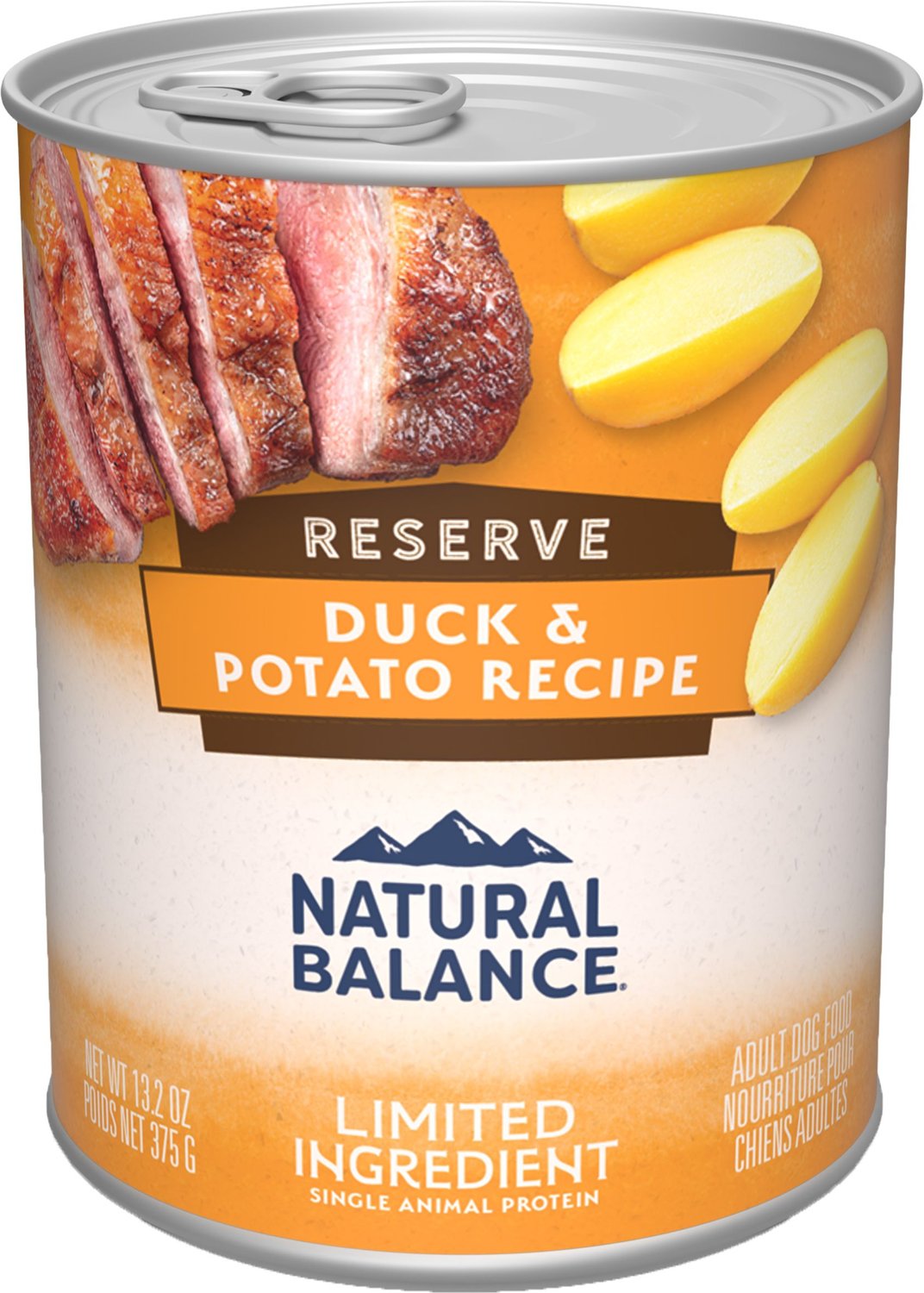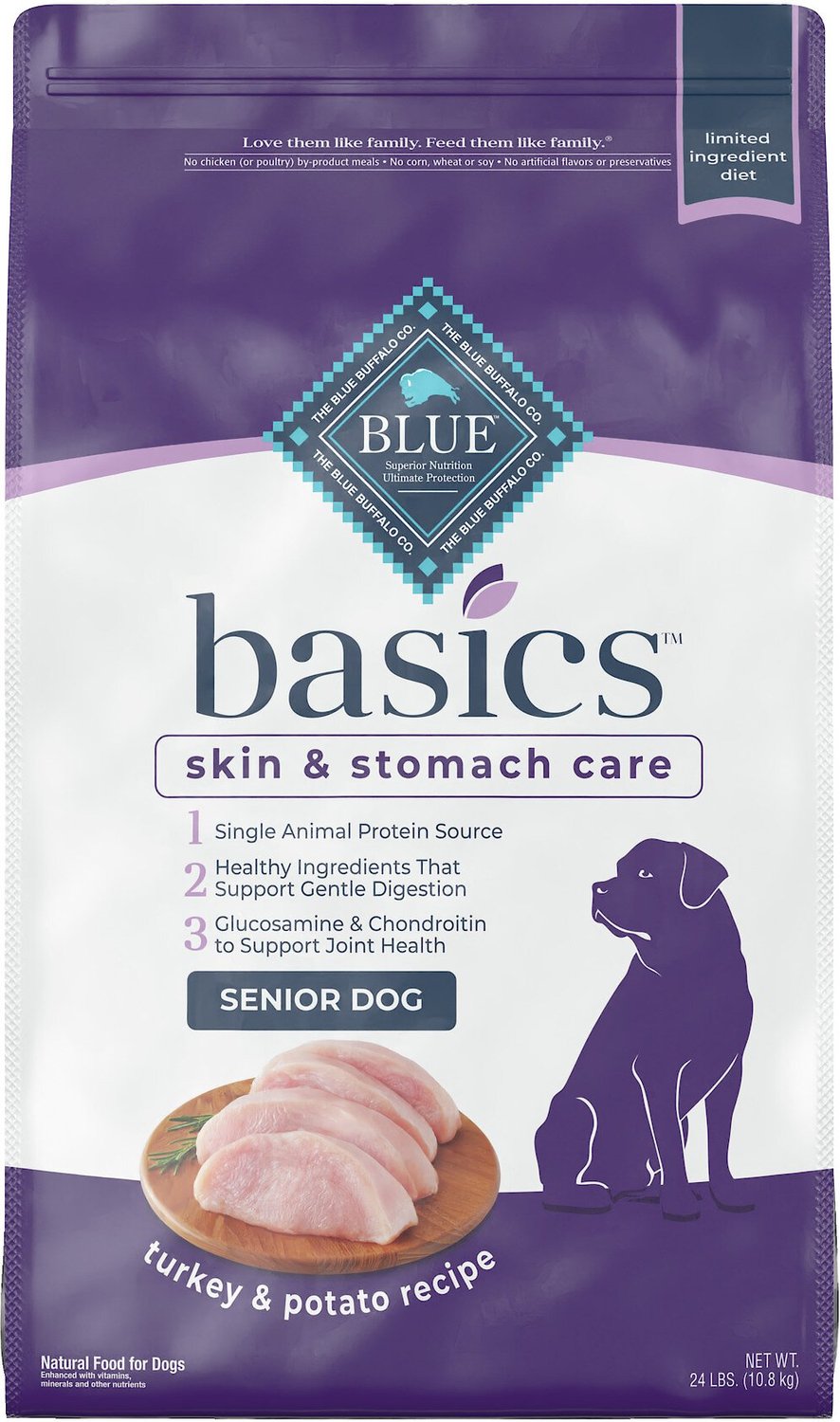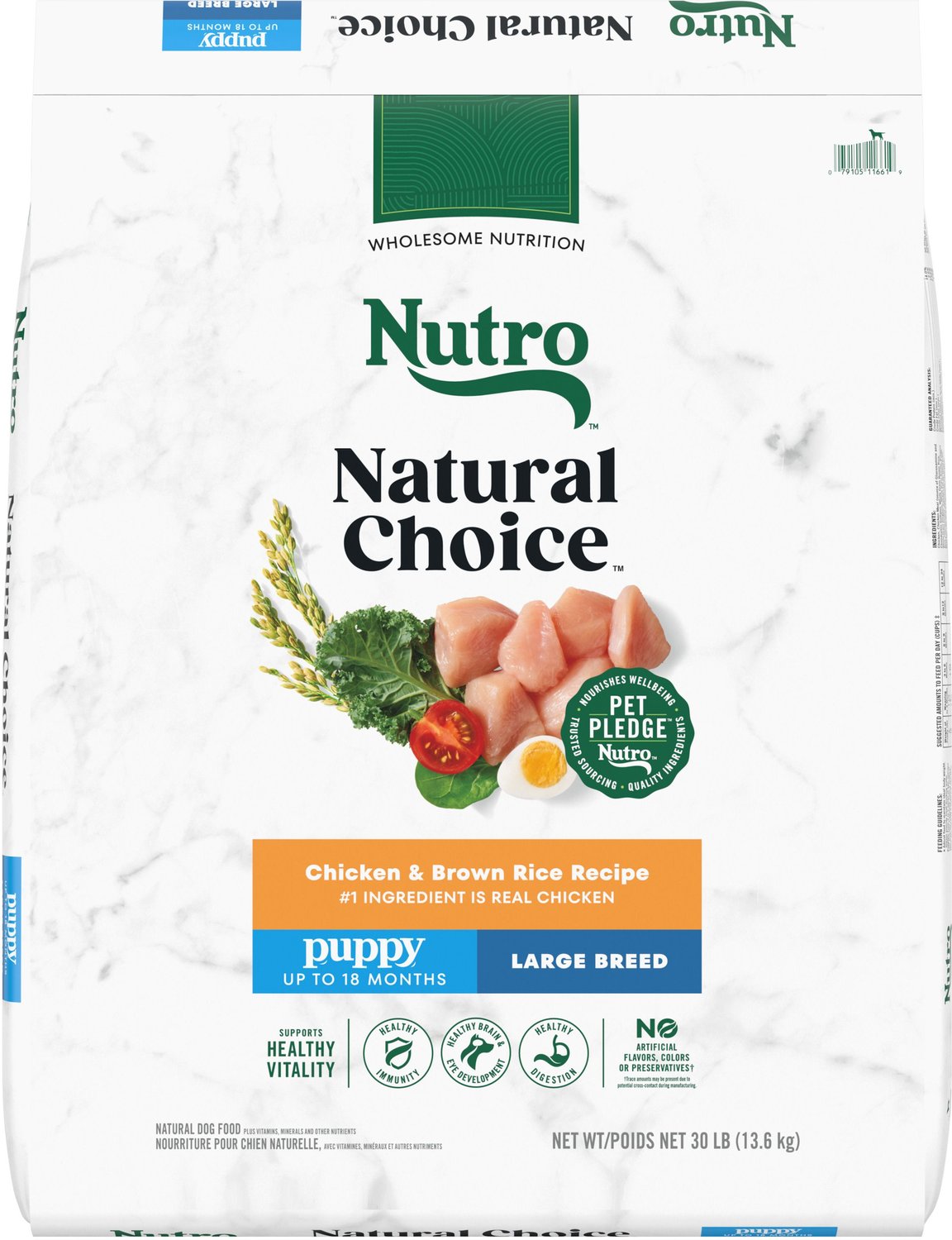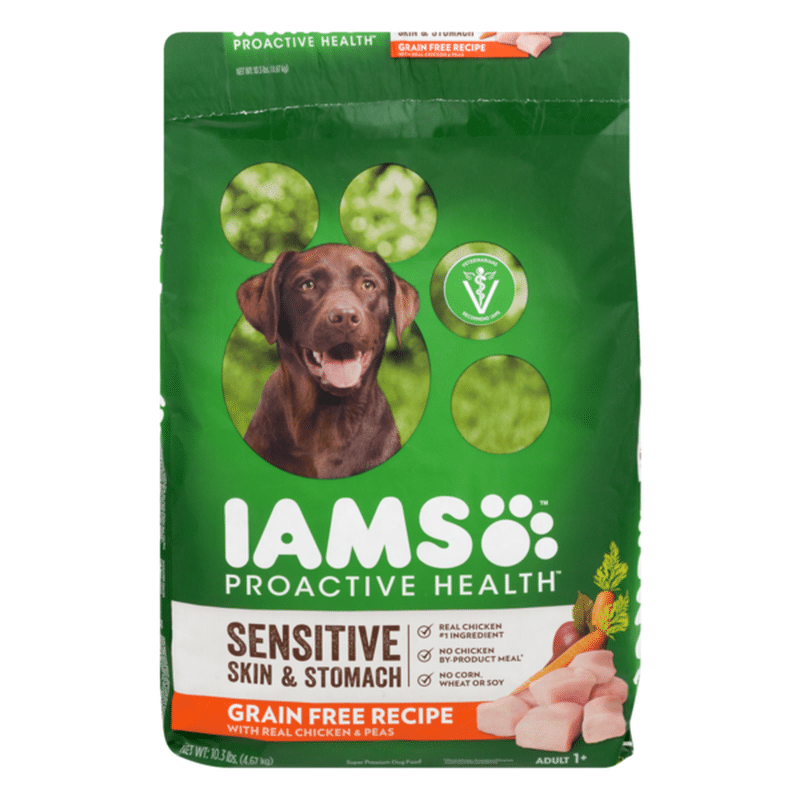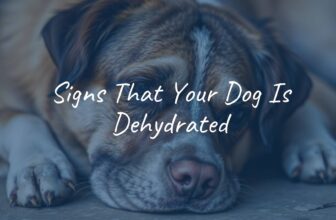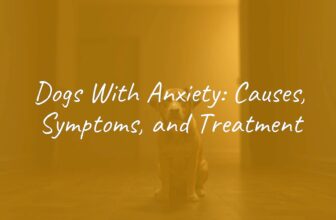
Gastrointestinal diseases are among the most common health issues in dogs. Here, we will discuss all the necessary information concerning these problems: symptoms, causes and how to deal with them through the right nutrition.
I believe we can all see how vital is that role and, therefore, how important it is to prepare the right nutrition plan. That is why we decided to review the best dog food for sensitive stomach.
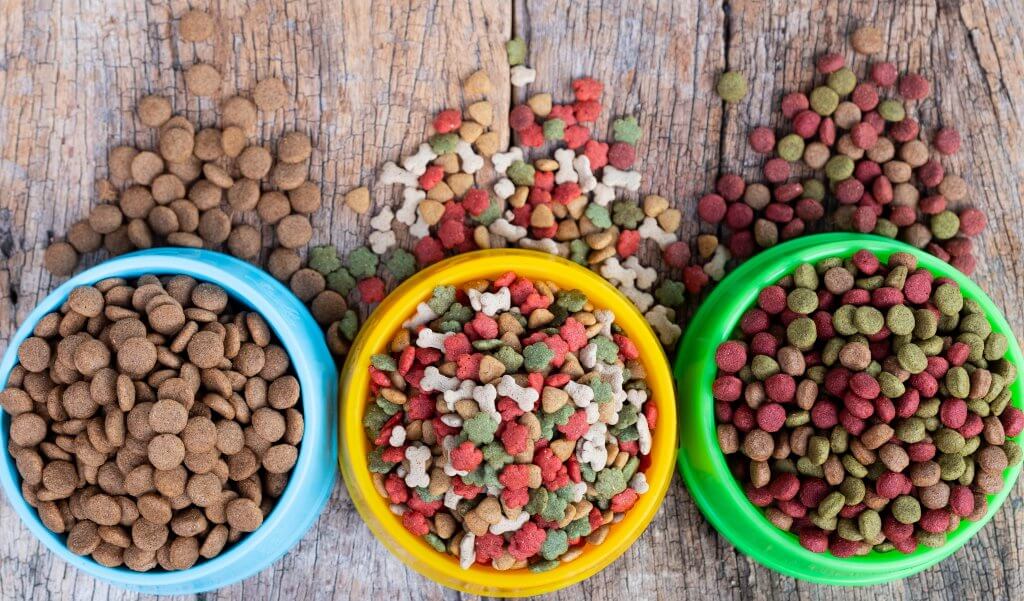
The digestive system tends to be very delicate as well, and all the changes, even the good ones, need to be monitored and implemented carefully. A lot of dog owners see the new diet as a panacea, a kind of a magic wand that will solve all of their dogs’ problems, especially the gastrointestinal ones.
However, this is not always the case. Nutrition is indeed an essential component if you want to solve your dog’s digestive issues. Sometimes, there are cases of various sicknesses, and that’s when the best diet can be a great help, but it will not resolve the problem at its core. Your dog may need specific medications or even surgery; that’s why it’s crucial to contact an expert. Never change your dog’s diet or implement any meds or supplements without a veterinary checkup.

THE DOGS’ DIGESTIVE SYSTEM
First of all, it seems right to start with a quick explanation of how the dogs’ digestive system is structured to know what can make it sensitive. It’s actually quite similar to ours, but with some significant differences that are worth remembering.
- The digestive system starts from the mouth. However, chewing is almost non-existent for dogs, and their saliva has very little digestive properties, so this part is not very important for the whole process of digestion. The only thing is that the saliva has a mechanical function – it helps the food slide better in the digestive tract.
- Then, the food goes through the oesophagus, a long passage tube, to the stomach. Since dogs don’t chew, their gastric acidity is much stronger than ours. Before it can digest proteins and other nutrients, it needs to use the ability to penetrate even the largest bites that dogs eat. Also, dogs’ stomachs are dilatable, which means that they can store large suppliers of food for later. That’s why most dogs can eat endlessly, and it’s important to control how much they consume.
- The dogs’ small intestine is very similar to ours; it’s a long tube that absorbs nutrients, in particular fats, proteins digested by the stomach, and carbohydrates digested by pancreatic amylase. It’s where the digestion is completed, and the absorption can begin. The duct from the liver supplies bile that dissolves the products of fat digestion. The pancreas delivers hormones that take part in the whole process of metabolism, for example, glucose, as the end product of the energy nutrients. A lack of another hormone, insulin, leads to diabetes. After reaching the small intestine, the nutrients are being absorbed by fold called villi. The microvilli take part in digestive enzymes production, absorbing nutrients, and blocking the absorption of waste products.
- The large intestine (colon), on the other hand, is smaller than ours. It acts as a storage space. Intestinal bugs take part in some digesting processes, but in general, there isn’t a lot of digesting activities in the large intestine. Only fluids, electrolytes, fatty acids and some vitamins can be absorbed there. Here enters the undigested food material, that’s why the motility in the colon is so important; issues there lead to diarrhea or constipation.
This is a short, simple version of how the digestion looks like in dogs. Of course, in reality, it’s a much more complicated process, and even the littlest issues at any point in this journey can lead to various health conditions. In this article, we will discuss the most common and the most striking of them, and give you tips on how you can help your dog at home by adjusting their diet.
FEEDING A DOG WITH INTESTINAL DISEASES
We always start with the assumption that any kind of a stomach problem will eventually lead to a lack of nutrition (or can be caused by it). Various diseases can affect the digestive system of a dog; for example, inflammation may cause pain to your Fido with its gastritis acids, or the pancreas may not produce its juices, or the intestine may not absorb all the necessary substances.
Whatever the case – the maldigestion or the pain combined with vomiting or the expulsion of ingested materials without absorption – your dog is not well-fed and doesn’t absorb the nutrients; therefore, they will need help to deal with the lack of them.
Depending on a problem, there are two things that can help your furry friend in this situation:
- The first option, more serious, would be to put your dog’s digestive system to rest; it’s especially recommended when there’s pain bothering your dog. In this case, a dog, that can’t absorb all the necessary nutrients on their own, is admitted to a veterinary clinic and fed parenterally (by bypassing the digestive system), or with an IV.
- The second option, more common, is to give your dog only the foods that are easy to digest and to absorb, as it will provide them with a large amount of the necessary nutrients, which will make it easier for them to absorb the right portion. This is recommended in cases of diarrhea, maldigestion, or malabsorption without much pain.
The first option is strictly medical and performed only by veterinarians, so here, we will only discuss the second one that can be carried out by the dog owner, but only if advised by the vet. That’s why you need to know all the basics, so next, we will help you by analyzing specific dog food components.
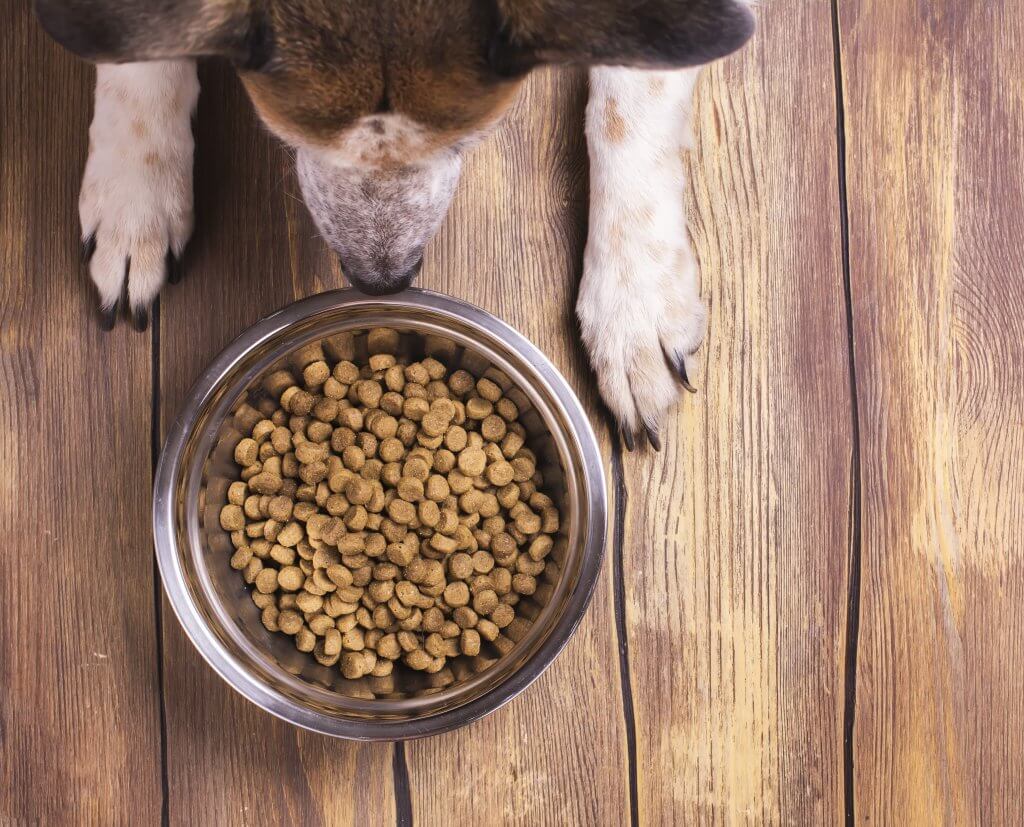
WATER
It may seem obvious because we all know that water is essential, but a lot of people don’t realize how crucial water is during gastrointestinal diseases. Your dog should always have access to freshwater, even when he’s 100% healthy. Whenever they experience a digestive problem, it becomes even more important; if your dog doesn’t want to drink on their own, you will need to help him.
The most common symptoms of gastrointestinal problems are vomiting and diarrhea. Both of them cause your dog to lose a lot of water. It can lead to dehydration, which is always dangerous, and in the most severe cases can even result in death.
If your dog has some trouble eating, you may consider switching to wet dog food that contains more than 34% of water; it will allow your friend to absorb all the necessary nutrients and stay hydrated. It may also be easier for their digestive system.
PROTEIN
Protein is among the most important components of dog food, as it helps them to stay strong and energized, but if your dog is sick and needs something to regain the energy, protein won’t be the fundamental component of their diet. That’s why, when it comes to gastrointestinal diseases, it’s not about increasing the number of proteins in a diet, but about improving the quality.
When your dog experiences digestive issues, it’s better to provide them with sources of proteins that are easier to digest, e.g., eggs or milk (instead of animal protein), those that have the highest biological value, aren’t hard on the stomach and can be absorbed by the intestine easier. Logically, if you give your dog food that’s more difficult to digest, the stomach will be forced to produce more acid, which increases the gastric inflammation. Moreover, these nutrients would take longer to transit, and it may result in diarrhea and not absorbing them at all.
This is why the number of proteins should not be increased, but their quality improved by offering the best of easily digestible sources.
LIPIDS
Lipids, or fats, are a crucial component of your dog’s diet, but they become even more important in case of issues with the digestive system. The organism converts them into energy, which plays a vital role while dealing with all health problems. The amount of lipids needs to be appropriately calculated, as too many fats may also lead to various issues with weight management, blood pressure, and heart health.
This is true for different types of digestive system diseases, from those affecting swallowing and preventing a dog from eating enough to gastrointestinal ones, as fat doesn’t support acid secretion. That’s why fats can easily reach the intestine, be absorbed, and converted into energy.
However, some conditions will require you to reduce or even eliminate lipids from your dog’s diet. For example, fats can worsen the situation in the case of pancreatic disease. So, if your veterinarian diagnoses your Fido with a pancreatic issue, you will need to make changes in your dog’s food. Energy can also be converted from carbohydrates, that are less concentrated, but also less harmful to the malfunctioning digestive system, so the best option in certain cases.
CARBOHYDRATES
Carbohydrates can be difficult to digest even for dogs with healthy digestive systems. They are rather complex and may be hard on a stomach that’s already been experiencing issues. Carbs are also the source of nutrition for intestinal bacteria, so they can pose a problem if your dog suffers from diarrhea caused by bacterial overgrowth.
So, if your dog doesn’t suffer from the above-mentioned pancreatic issues, it would be better to avoid carbs as their primary energy source. Always favor fats above carbohydrates, also when it comes to recovering from gastrointestinal problems.
To provide carbs, look for the highly digestible sources, such as the boiled (e.g., pasta, rice) or the extruded ones (the commercially-prepared foods). Avoid bread, biscuits, and other dry foods that tend to be harder on your dog’s stomach.
FIBER
You need to be careful how much fiber you’re providing your dog with, especially when they suffer from gastrointestinal issues, as fiber tends to increase the intestinal motility, which isn’t always desired with sensitive stomach problems.
When there’s no diarrhea, the balance of fiber and other nutrients won’t change, but when your Fido suffers from diarrhea, then the the best dog food for sensitive stomach should apply this rule: less fiber, the better. Apart from the growth of the number of intestinal bacteria, it would also make the intestine to store more water, which will worsen the condition. However, the less, the better doesn’t mean anything at all, as fiber is necessary to keep the bowels moving.
On the other hand, in cases of constipation, your dog will need lots of vegetable fiber to restart the bowel movement he’s evidently lacking. Fiber will dissolve the blockage in their intestine and enable defecation.
MINERALS AND VITAMINS
Vitamins contain carbon, which means they are organic compounds. Your dog needs them because their body can’t synthesize them on its own, and, only in small quantities. Vitamins support your dog’s metabolism, regulate the levels of some minerals, such as calcium and phosphorus, improve the immune system, serve as antioxidants, take part in blood clotting, and take care of the nervous system.
There are vitamins soluble in fat or those soluble in water. The earlier are stored in the liver and fatty tissues while the latter are not stored at all, so they need to be regularly provided. All of your dog’s foods require vitamin supplementation, so take care of it if you prepare it yourself, or pay attention to what you’re buying if you feed your dog commercially-prepared food.
Minerals, on the other hand, are inorganic compounds that maintain proper metabolic function, constitute a significant part of bones, distribute oxygen throughout the body, help to heal, provide antioxidant supports, regulate fluids, and help the nervous system. Your dog’s organism is unable to produce them on its own, so they need to be present in the food. There are microminerals and macrominerals. The latter is required in larger quantities, but both are equally important.
It’s crucial to stay in contact with your veterinarian and not to add any supplements to your dog’s food on your own. All problems need to be identified by a professional.
???? BEST DOG FOOD FOR SENSITIVE STOMACHS
There are tons of commercially-prepared foods for dogs with sensitive stomachs on the market right now. It seems great that you have a choice and can be sure that there certainly is food that your dog will like and benefit from. On the other hand, it may be overwhelming, especially if you really want what’s best for your furry friend, but you have no idea how to tell the difference between the good dog food and the bad, or even the mediocre.
Luckily for you, we have gathered a team of veterinary experts and pet lovers who used their experience and expertise to create the list of the best dog food for sensitive stomachs.
Instinct Limited Ingredient Diet Grain-Free Recipe with Real Lamb Freeze-Dried Raw Coated Dry Dog Food
Instinct is a pet food company whose mission is to provide dogs and cats with minimally processed, protein-packed, raw and fresh foods, and all that for an affordable price. Limited Ingredient Diet Grain-Free Recipe with Real Lamb Freeze-Dried Raw Coated Dog Food is yet another example that they are excellent at what they’re doing. The recipe is simple but delicious, wholesome, and well-balanced. This dog food will help you to keep your best friend undisturbed, happy, and energized.
- wholesome dry food for all-sized dogs in adult life stage
- without any grain, dairy, eggs, chicken, beef, fish, sweet potato, potato, chickpeas, corn, wheat, soy, artificial colors or preservatives
- one of the best choices for sensitive digestion, limited ingredient, grain-free, and gluten-free diet
- one animal protein source – highly digestible grass-fed lamb – also provides amino acids
- guaranteed levels of natural omega fatty acids and antioxidants for healthier skin and coat, and strong immune system
- crude protein: min. 24%
- crude fat: min. 21.5%
- crude fiber: max. 3.5%
- moisture: max. 10%
Purina Pro Plan Focus Adult Sensitive Skin & Stomach Salmon & Rice Formula Dry Dog Food
Purina Pro Plan has been providing pets with their wholesome formulas for some time now, gaining loyal customers among dogs, cats, and their loving owners. Their Focus Adult Sensitive Skin & Stomach recipe will help you to ease your dog’s sensitive stomach and let them thrive despite their sensitivities. With salmon as the first ingredient and other special components, this dry food is rich in animal protein and fish oil, highly digestible, and beneficial for your dog’s intestinal bacteria.
- dry food for all-sized adult dogs with sensitive digestion
- real salmon as the number one ingredient is rich in protein and supports strong and lean muscles
- highly digestible oatmeal is the source of the right amount of carbohydrates
- with prebiotic fiber to help digestion
- omega-3 fatty acids help your dog maintain healthy joints, while omega-6 promotes healthy skin and coat
- no peas, corn, wheat, soy, poultry by-products, artificial colors or flavors
- crude protein: min. 26%
- crude fat: min. 16%
- crude fiber: max. 4%
- moisture: 12%
Solid Gold Holistique Blendz with Oatmeal, Pearled Barley & Ocean Fish Meal Sensitive Stomach Dry Dog Food
Solid Gold pet food company bears our pets’ best interest at heart, providing the market with the best products, holistic nutrition, and simple, natural recipes. Their Holistique Blendz with Oatmeal, Pearled Barley & Ocean Fish Meal Sensitive Stomach Dog Food will make your dog fall in love with the taste while keeping them healthy and happy. The formula was specially developed to support healthy digestion and boost the immune system.
- whole-grain dry food for all-sized dogs in adult life stage
- no corn, wheat, soy
- well-balanced meals consisting of ocean fish meal and healthy whole grains (such as brown rice and pearled barley)
- rich in protein diet with no potatoes to support healthy digestion
- the mix of vitamins, minerals and other nutrients for gut health and boosting the immune system
- protein: 18%
- fat: 6%
- fiber: 4%
Solid Gold Wee Bit Bison & Brown Rice Recipe with Pearled Barley Small Breed Dry Dog Food
Solid Gold prepared another wholesome meal, this time for all small-sized dogs of all life stages. Even though your Fido is a little smaller doesn’t mean that they don’t need as much nutrition as bigger dogs. It’s equally important to keep them healthy, active, and energized, and thanks to this try food, it has never been easier, even if your dog struggles with digestion issues. This food will provide your dog with the best animal protein, whole grains, healthy fats, and a carefully-prepared blend of superfoods for your dog to thrive.
- holistic dry food for small, extra small and toy dogs
- no corn, wheat, soy
- healthy, whole grain recipe for dogs of all life stages
- rich in protein for lean and strong muscles
- essential nutrients and lots of good fiber to support proper digestion
- made with real bison meat and a unique mix of nutritious superfoods (pumpkin, cranberries, blueberries, carrots, broccoli, almond oil, kelp, and lentils)
- omega fatty acids for healthy skin and coat
- prebiotics for rebuilding the good gut bacteria and promoting proper digestion
- protein: 28%
- fat: 28%
- fiber: 4%
Wellness Simple Limited Ingredient Diet Grain-Free Salmon & Potato Formula Dry Dog Food
When it comes to foods formulated by Wellness, all of their ingredients are carefully chosen by their veterinary experts to serve a specific purpose. It is especially visible in the case of this Simple Limited Ingredient Diet Grain-Free Salmon & Potato Formula Dog Food, which has a single source of protein and only highly digestible carbohydrates, without any fillers or additives. Wellness aims to keep all the pets healthy and satisfied and provide them with a long and happy life.
- limited ingredient diet for all-sized dogs in adult life stage
- high-quality real salmon as the first ingredient for lean muscles, energy, and overall health
- the best, all-natural ingredients support healthy metabolism in dogs with sensitive stomachs
- easily-digestible recipe with healthy probiotics and nutrients for skin and coat health
- no grain, gluten, wheat, corn, soy, dairy, eggs, by-products, artificial flavors, colors, preservatives
- crude protein: min. 25%
- crude fat: min. 12%
- crude fiber: max. 5%
- moisture: max. 11%
CANIDAE All Life Stages Multi-Protein Formula Dry Dog Food
CANIDAE All Life Stages Multi-Protein Formula
Whether you have a puppy Chihuahua or a senior German Shepherd, you can be sure that they will be content with this dry dog food provided by Canidae. All Life Stages Multi-Protein Formula was developed for all dogs with sensitive stomachs, no matter their age or breed. It was formulated by veterinarians to make sure that canines get all the necessary nutrients for healthy digestion, good mood, and long and happy life. You don’t have to worry about different types of foods for every stage of your pup’s life – this product is all you need.
- chicken, turkey, lamb and fish meals provide protein-rich food nutrition
- HealthPLUS Solutions – probiotics, antioxidants and fatty acids for improving the overall health of your dog
- no common allergens, such as wheat, corn or soy
- dry food developed by veterinary experts for all dogs (all breeds, all sizes, all ages)
- only the best, premium ingredients and lots of nutrients for a tasty and healthy meal
- crude protein: min. 24%
- crude fat: min. 14.5%
- crude fiber: max. 4%
- moisture: max. 10%
Natural Balance L.I.D. Limited Ingredient Diets Duck & Potato Formula Grain-Free Canned Dog Food
Natural Balance L.I.D. Limited Ingredient Diets
Natural Balance developed a unique formula for all dogs, no matter their breed, size, or age, who suffer from food allergies, intolerances, or sensitivities. Limited Ingredient Diets Duck & Potato Formula Grain-Free Canned Dog Food is a holistic wet food that your furry best friend will enjoy, but it will also benefit their health. It combines one protein source and one carbohydrate source to provide a canine with all essential nutrients without upsetting their tummy.
- a complete and well-balanced wet food for all-sized dogs of all breeds and and each life stage
- limited number ingredients and no allergens for dogs with sensitive stomachs
- highly digestible formula with maximum nutrient absorption
- supports the healthy immune system with vitamins and minerals
- potatoes as an easily-digestible carbohydrate source
- crude protein: min. 5%
- crude fat: min. 4%
- crude fiber: max. 2%
- moisture: max. 78%
Blue Buffalo Basics Limited Ingredient Diet Turkey & Potato Recipe Senior Dry Dog Food
Blue Buffalo Basics Limited Ingredient Diet
This Limited Ingredient Diet Turkey & Potato Recipe provided by Blue Buffalo Basics confirms that less is more, and can make all the senior dogs happy, no matter their size or breed. There may be fewer ingredients, but they were all carefully chosen by veterinary specialists for maximum nutrition essential for seniors to stay healthy and satisfied, especially if their stomachs tend to get sensitive.
- only the best, high-quality ingredients, including real turkey, potatoes, peas, and pumpkin, to help healthy digestion
- well-balanced dry dog food with essential protein and carbohydrates to keep your senior dog energized
- no artificial flavors, preservatives or colors, no chicken, beef, wheat, corn, soy, chicken by-products (e.g. chicken meal), dairy, and eggs
- carefully-prepared blend of antioxidants, vitamins and minerals support healthy immune system
- crude protein: min. 18%
- crude fat: min. 10%
- crude fiber: max. 7%
- moisture: max. 10%
Nutro Wholesome Essentials Large Breed Puppy Farm Raised Chicken
Nutro Wholesome Essentials Large Breed Puppy
Nutro developed Wholesome Essentials Large Breed Puppy Farm-Raised Chicken to help all cute little puppies of large-sized breeds develop properly, even if they struggle with sensitive stomachs. This is the perfect choice if you want to help your new furry best friend to start their life on the right foot. It was specially formulated to meet all the needs of large-breed puppies – help their growing joints, strengthening bones, and boosting the immune and digestive systems.
- naturally-sourced glucosamine and chondroitin help your growing puppy develop properly by maintaining their joints healthy
- farm-raised chicken as the first ingredient for strong and lean muscles, and lots of energy for playing
- calcium supports strong bones
- omega-3 fatty acids help the immune system while growing
- non-GMO ingredients, no no chicken by-product meal, corn, wheat, or soy protein and no artificial flavors, colors or preservatives
- all-natural, all made in the USA
- crude protein: min. 28.0%
- crude fat: min. 15.0%
- crude fiber: max. 3.0%
- moisture: max. 10.0%
Iams ProActive Health Sensitive Skin & Stomach with Real Chicken & Peas Grain-Free Dry Dog Food
Iams ProActive Health Sensitive Skin & Stomach
Iams ProActive Health developed their Sensitive Skin & Stomach formula with real chicken and peas to provide all-sized adult dogs of all breeds with grain-free dry dog food. It was formulated by specialists to make sure that the recipe is adjusted to the needs of dogs with sensitive stomachs and food allergies. If you want to provide your Fido with all the necessary nutrients without causing more problems to his little tummy, this food is a great choice.
- grain-free food for all dogs in adult life stage with sensitive skin and stomachs
- wholesome, holistic meals with chicken as the first ingredient, enriched with veggies, peas, vitamins, minerals, antioxidants and omegas to support overall health
- no grains, wheat, corn, soy, artificial flavors, colors or preservatives
- vitamin, minerals, and antioxidants support the healthy and strong immune system and promote a shiny coat and healthy skin
- fiber-rich peas help in healthy digestion
- crude protein: min. 25.0%
- crude fat: min. 15.0%
- crude fiber: max. 4.0%
- moisture: max. 10.0%
CONCLUSION
Our veterinary experts and pet lovers gathered this list of ten best food for a sensitive stomach to help you choose the right diet for your beloved four-legged best friend. However, if you have already chosen a brand that has not been included in that list, it doesn’t mean it’s wrong, and you shouldn’t even consider it. If you trust your vet then probably it is the best dog food for sensitive stomach of your furry friend. The most important thing is to know the specific and overall needs and condition of your dog to be able to provide them with everything they need and to understand what you should always avoid while researching dog food. After all, it’s the least you can do to give them something in return for their unconditional love.

THE BUYER’S GUIDE
If your furry friend has a sensitive stomach, or you suspect they may have, you probably have many questions. Of course, the first and the most important thing to do is to schedule a checkup at your veterinarian’s, but in order to help you in this new situation, we have gathered all the necessary information regarding best dog food for sensitive stomachs.
In general, dogs are omnivores, which means that they need both meat and plants in their diets. Most dogs are really able to eat and digest almost any food, but, just like people, they can suffer from food allergies, intolerances and sensitive stomachs.
How can I tell if my dog has a sensitive stomach?
Some symptoms are obvious. You certainly can tell when your dog has diarrhea, intermittent loose stools, or even constipation if you walk them every day yourself. However, your Fido may also suffer from less obvious symptoms that they won’t be able to tell you about, such as nausea (when a dog is nauseous, they don’t eat, they lick their lips and swallow a lot). There may also be blood in their stools, or they may vomit. Most probably, they won’t behave like themselves in general – they won’t be as eager to play, or they will even try to avoid a walk. In chronic, more severe cases, your dog will lose weight. Apart from that, a sensitive stomach can also cause itchy skin, so make sure your dog doesn’t scratch more than usual, and that there aren’t any hairless or sore spots on their body.
It’s important to take notice of the frequency and types of symptoms, as it will help your veterinarian with a diagnosis. A sensitive stomach may have symptoms similar to those of other diseases of the digestive system (such as irritable bowel syndrome or pancreatitis).
What type of dog food is best for a sensitive stomach?
Since there may be many causes of diarrhea, vomiting, or other stomach issues, you will need your veterinarian to assess your dog’s overall health condition. The best possible diet will need to be recommended by a specialist who will take into consideration all health problems, and your pet’s individual needs and preferences.
As a dog owner, you may try putting your Fido on a short-term bland diet; it should help if these aren’t any serious, digestive issues. Foods like boiled, plain chicken with rice are highly digestible and nutritious, while canned pumpkin can be helpful in dealing with diarrhea. If there’s a need, your vet will prescribe a prebiotic to help your dog rebuilt their healthy gut flora and the lack of nutrients. Prebiotics are usually sold in the form of a powder or liquid that can be added yo your dog’s food.
If your dog has a long-term sensitivity problem, you will probably need to switch to foods for sensitive stomachs, but do it only if your veterinarian recommends it. Luckily, these foods can be easily found among commercially-prepared meals. They contain only ingredients that are easy to digest but can still provide your dog with all the necessary nutrients. They usually have a lot of fiber ingredients that help to firm up loose stools, contain fewer fats that are harder to digest for dogs, and have prebiotics to promote healthy bacteria in their guts.
Always make sure that the chosen dog food meets all the Association of American Feed Control Officials (AAFCO) nutrition standards, and that the food provides best, complete and holistic meals (the appropriate amounts of fiber, protein, fat, vitamins, minerals, and carbs).
What is limited ingredient dog food?
As the name suggests, limited ingredient dog food is the food that contains a small number of ingredients. However, people can’t compromise as to what kind of ingredients should be there. There’s no regulatory definition, so you will most likely find various types of limited ingredient dog diets. Originally, these used to be foods with only one source of protein and on carbohydrates source, as it was the way for veterinarians to identify the causes of food allergies. However, when limited ingredient dog foods became mainstream, and various dog food companies started to manufacture it, the situation changed. Usually, commercially-prepared limited ingredient dog foods contain one or two protein ingredients, and one to two carbohydrates; other companies simply use fewer ingredients than while producing the standard kibble formulas. Nonetheless, whatever the case, as long as the food meets all the required standards, it will provide your dog with the essential nutrients despite being made from a limited number of ingredients.
How to choose the best limited ingredient dog food?
Of course, the final decision will depend on your dog’s individual needs and preferences, but there are some general tips on how to choose the best dog food for sensitive stomach with limited ingredients.
- One protein source. You probably could find food with two protein sources that would be perfectly alright, but having only one protein ingredient will help you keep track of what your dog eats and what can upset their sensitive stomach. A single protein source foods are more helpful in preventing further sensitivities.
- One carbohydrates source. The rule mentioned above applies to carbohydrates sources as well. It’s not unusual for pets to be sensitive to various carbs, so it may be a good idea to limit them without depriving your dog of the necessary nutrients.
- New protein sources. It’s rare for pets to be sensitive to something they haven’t eaten before. The most common protein sources are chicken and beef, so your dog has probably already tried them. That’s why many limited ingredient dog foods may contain the lamb or salmon.
- No grains. Various grains are very often linked to food allergies, especially wheat, corn, and soy. Just like in people, they can flare up sensitivities in dogs. It’s not true that canines can’t digest grains at all, contrary to what many people believe, but they are quite common allergens. So if your dog already has a sensitive stomach, it’s better to avoid them.
- No artificial ingredients. There isn’t much evidence that artificial ingredients can spark up any allergies in dogs. Still, if your Fido experiences sensitive stomach problems, you don’t want to stuff them with colorants, preservatives, and unnatural flavors. The best limited ingredient dog foods are complete and natural meals.
What is hypoallergenic dog food?
Just like regular hypoallergenic foods are developed for people with various food allergies, hypoallergenic dog foods are specially formulated to help canines with food allergies, intolerances, and stomach sensitivities. They consist of wholesome and nutritious ingredients that aren’t typically used in dog cuisine but can be lighter on their stomachs and provide them with the same benefits without flaring up allergies.
Unfortunately, there aren’t any lists of ingredients that should be included in hypoallergenic foods, and some companies use it only as a marketing slogan without actually thinking about our dogs’ sensitive stomachs. The sure thing is that hypoallergenic food shouldn’t contain many processed or unnatural components. It’s good to think about your dog’s meal as naturally as possible – what would they eat if they had stayed wild?
It’s also important to buy foods that are high in natural sources of protein, such as real meat and real fish. But always remember to consult with a veterinarian before implementing any changes in your Fido’s diet.
What is prescription GI dog food?
Prescription GI (gastrointestinal) dog foods are specially formulated meals for all dogs with gastrointestinal issues. The recipes are very often similar to those of hypoallergenic food or limited ingredients food, but they also include components that support healthy digestion and solving problems of the digestive system. Manufacturers of GI dog food make sure that your Fido gets all the necessary nutrients to develop properly, and stay healthy and active without upsetting their sensitive stomach.
FAQ
How do I safely transition to new food if my dog has a sensitive stomach?
Safely transition to new food is just as important for your dog’s stomach as choosing the right food. The essential thing to remember at all times is to do it gradually and stay patient. Your dog’s stomach, especially if it’s sensitive, needs time to adjust to the new food, even if it’s a change for better. Most domestic dogs and cats eat the same food for months, or even years, so their stomachs are not accustomed to change. Changing their diet too quickly may lead to more problems with vomiting, diarrhea, and excess gas.
The best way is to mix it up. Start with adding a little bit of new food to the old, and then, if your dog takes it alright, gradually change the proportions by adding more and more new food to less and less old food. If your Fido is a real fussy eater or their stomach is truly sensitive, you can start with as little as 5%-10% of new food for a meal.
It’s essential to keep track of how much calories you feed your dog, so make sure you know all there is to know about both new and old food. If one food has more calories per meal than the other, you will need to adjust the daily portions. Plus, always use a measuring cup to make sure that you provide them with the same nutritious meal every day. It really is essential for meals to be exactly the same.
If at any stage, you notice that your dog experiences any gastrointestinal upsets, stay with the current ratio of old food to the new the same for a couple of days.
What causes sensitive stomachs in dogs? Can they be avoided?
Very often, there is no straightforward answer. Many allergies, intolerances, and sensitivities are congenital, which means that a dog was born with them. If that’s the case, you will notice a problem quickly, when your dog is still a puppy – they will vomit, be prone to diarrhea, abnormal stools, or excess gas. Sometimes you won’t need to do much – a tablespoon of prebiotic plain yogurt may be enough to ease their upset stomachs – but it’s important to consult with a veterinarian first to rule out other diseases of the digestive system. These are other causes of sensitive stomachs; if your dog suffers from a health condition, such as pancreatitis, colitis, or malabsorption disorder, it won’t matter what you’re feeding them.
However, even if your pup wasn’t born with any allergies, intolerances, and sensitivities, it doesn’t mean that they can’t suddenly appear at any age. This can be caused by a wrong ingredient in their food, a sudden switch to a new diet, bacterial infections, or even mental distress.
Can I cook for my dog with a sensitive stomach?
If you have time and are able to commit like this, you can cook your dog’s food (daily or once a week, and freeze or refrigerate them). It will allow you to be fully in control of what your furry friend is eating, which will help you avoid unwanted, hidden ingredients, but it will also require you to know all about pet feeding. There should be no mysteries for you as to what nutrients you need to include in the meals, how to source protein, fats, fiber, vitamins, minerals, and carbs. Be sure to get all the components from verified sources so that they are always of high quality.
Meals for sensitive stomachs should be low in fat and contain lots of good fiber to help them digest and absorb the essential nutrients. Among recommended ingredients are boiled chicken breast (boneless and skinless, of course), white rice, mashed potatoes, cooked noodles, scrambled eggs, low-fat cottage cheese, turkey hot dogs, and hamburger meat (fat drained off). Rice, or other bulky parts of the meal, should be calculated three parts and meat one part of the meals. Yogurt may help your pet rebuild the good bacteria in their gut, and canned plain pumpkin helps to digest. When it comes to supplements, add them only if recommended by a veterinarian.

